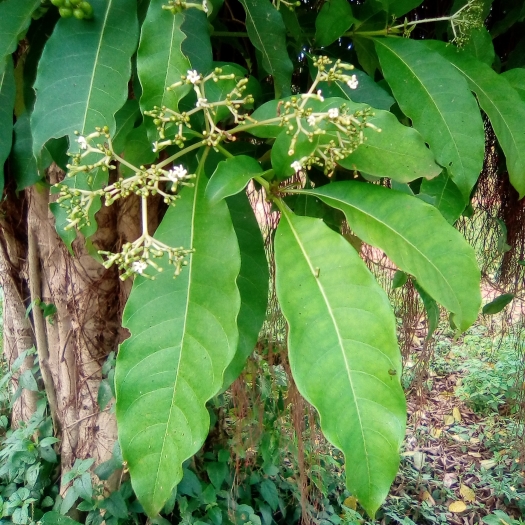Poison Devil’s-Pepper
(Rauvolfia vomitoria)
Poison Devil’s-Pepper (Rauvolfia vomitoria)
/
/

Dégboé Etienne Houédoté
CC BY 4.0
Image By:
Dégboé Etienne Houédoté
Recorded By:
Copyright:
CC BY 4.0
Copyright Notice:
Photo by: Dégboé Etienne Houédoté | License Type: CC BY 4.0 | License URL: http://creativecommons.org/licenses/by/4.0/ | Rights Holder: Dégboé Etienne Houédoté | Publisher: iNaturalist | Date Created: 2021-10-26T09:09:52-07:00 |







Estimated Native Range
Summary
Rauvolfia vomitoria, commonly known as poison devil’s-pepper, is a small tree or large shrub native to tropical Africa, specifically from Senegal to Tanzania and south to Angola. It is also naturalized in parts of tropical Asia. This species typically grows up to 26 feet tall and is characterized by its whorled branches with groups of three leaves at swollen nodes. The leaves are glossy and dark green, providing a lush appearance. The small, tubular, white flowers are fragrant and bloom in clusters, primarily during the warmer months. They are followed by globular, bright red fruit that can add ornamental interest.
Poison devil’s-pepper is known for its medicinal properties, particularly in traditional African medicine, where various parts of the plant are used to treat a range of ailments. In cultivation, it can serve as an accent plant or be used for hedging in tropical and subtropical gardens. It prefers full sun to partial shade, well-drained soils, and moderate watering, although it is drought-tolerant once established. Gardeners should be cautious, as all parts of the plant are toxic if ingested.CC BY-SA 4.0
Poison devil’s-pepper is known for its medicinal properties, particularly in traditional African medicine, where various parts of the plant are used to treat a range of ailments. In cultivation, it can serve as an accent plant or be used for hedging in tropical and subtropical gardens. It prefers full sun to partial shade, well-drained soils, and moderate watering, although it is drought-tolerant once established. Gardeners should be cautious, as all parts of the plant are toxic if ingested.CC BY-SA 4.0
Plant Description
- Plant Type: Shrub, Tree
- Height: 7-26 feet
- Width: 4-8 feet
- Growth Rate: Slow, Moderate
- Flower Color: White
- Flowering Season: Spring, Summer
- Leaf Retention: Evergreen
Growth Requirements
- Sun: Full Sun, Part Shade
- Water: Medium
- Drainage: Medium
Common Uses
Border Plant
Natural Habitat
Native to tropical Africa and naturalized in tropical Asia
Other Names
Common Names: Poison Devil’s Pepper, Swizzle Stick, African Snakeroot, Asofeyeje, Cui Tu Luo Fu Mu, Poison Devil-Pepper, Inkberry, Swizzle-Stick-Tree
Scientific Names: , Rauvolfia vomitoria, Rauvolfia congolana, Rauvolfia dichotoma, Rauvolfia pleiosiadica, Rauvolfia senegambiae, Rauvolfia stuhlmannii,
GBIF Accepted Name: